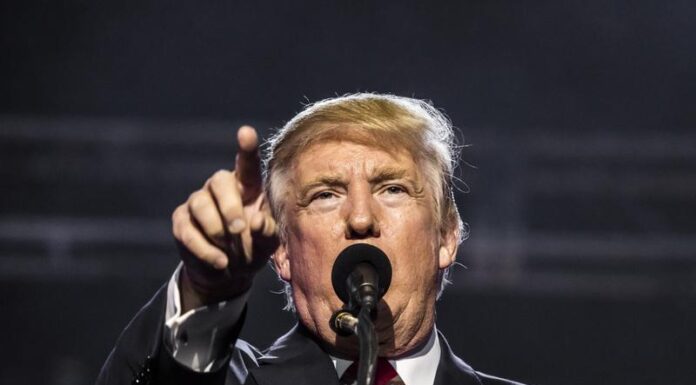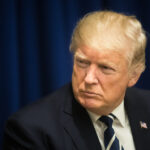President Donald Trump sharply criticized a Wall Street Journal reporter aboard Air Force One on Sunday, May 4, following an inquiry about his discussions with Russian President Vladimir Putin regarding the ongoing conflict between Russia and Ukraine.
The incident occurred as Trump traveled from West Palm Beach, Florida, to Joint Base Andrews in Maryland. The exchange started when Trump asked the journalist to identify their media outlet, a strategy he has often used during his second term.
Upon learning that the journalist was from The Wall Street Journal, Trump immediately voiced his dissatisfaction with the publication. His displeasure appeared to be linked to what he views as the traditionally conservative newspaper’s unfavorable coverage of his administration.
“That’s what I thought. Boy, you people treat us so badly. Wall Street Journal has truly gone to hell. Go ahead, yeah. Rotten newspaper. You hear me? What I said? It’s a rotten newspaper,” Trump told the journalist in a moment that was captured on video.
Although Trump initially invited the reporter to proceed with their question, he later declined to answer the inquiry about his talks with Putin concerning peace negotiations between Russia and Ukraine.
The president stated he would not engage with The Wall Street Journal, accusing the publication of being “China-oriented” and detrimental to American interests.
This interaction is the latest in a series of tensions between Trump and the Rupert Murdoch-owned newspaper. Despite its conservative stance, The Wall Street Journal has criticized several of Trump’s policies since he assumed office again.
The newspaper’s editorial board has been particularly critical of Trump’s trade policies and tariffs, which it has described as the “Dumbest Trade War in History” and warned they could “sink his Presidency.”
In response to these criticisms, Trump has previously stated that he doesn’t “understand” the editorial board and has characterized their thinking as “antiquated and weak.”
The Wall Street Journal has maintained its position despite Trump’s criticisms, continuing to label his tariffs as “the biggest economic policy mistake in decades” and urging the president to negotiate a swift end to what they call his “tariff barrage.”
Trump’s interaction with the reporter follows a pattern of challenging exchanges with members of the press during his second term. Just weeks earlier, he had a similar encounter with Washington Post correspondent Michael Birnbaum, who questioned whether Putin showed disrespect by continuing military actions in Ukraine amid peace talks.
During that incident, Trump told Birnbaum that the Washington Post had “lost a lot of credibility” before eventually addressing one of his questions.
This latest incident comes amid Trump’s ongoing efforts to mediate peace between Russia and Ukraine. Recently, discussions have included competing peace proposals, one backed by Ukraine and its European allies and another supported by the Trump administration.
According to diplomatic sources, Trump’s proposal reportedly included recognizing Russian control of Crimea, providing “robust security guarantees” for Ukraine, preventing Kyiv from joining NATO, and lifting sanctions against Russia.
Meanwhile, Ukrainian President Volodymyr Zelensky and European leaders have advocated for a plan that would begin with a ceasefire followed by territorial discussions. Kyiv would receive defense guarantees similar to those in NATO’s Article 5.
Tensions between Trump and Zelensky escalated in February when the two leaders engaged in a shouting match during a meeting at the White House, which ended with Zelensky being asked to leave.
Trump has consistently expressed confidence that his relationship with Putin will lead to resolving the conflict, despite Russia’s continued military presence in Ukraine. Last month, the president claimed on social media that Russia and Ukraine were “very close to a deal” and urged the two parties to meet “at very high levels” to finalize an agreement.
The administration’s approach to the Russia-Ukraine war has drawn criticism from domestic political opponents and international allies, who express concern that Trump’s proposed peace terms may be overly favorable to Moscow.
Trump’s contentious relationship with mainstream media outlets, including those traditionally aligned with conservative viewpoints like The Wall Street Journal, continues to define his presidential communication style as he navigates complex international negotiations and domestic policy challenges.








